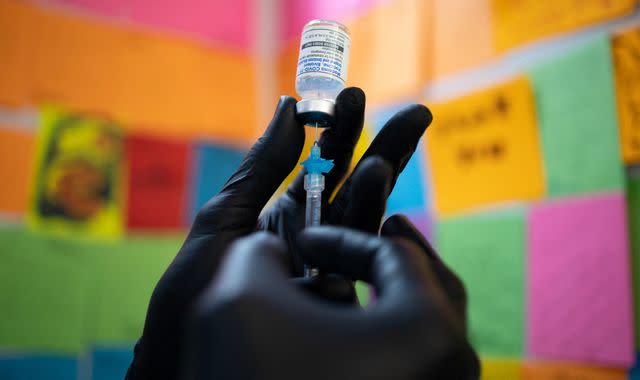Spring and autumn boosters planned for people most at risk from COVID

People at higher risk of severe COVID should be given a booster in the autumn, officials have said.
A smaller group of people, such as those who are older or are immunosuppressed, should get an extra booster in the spring, the Joint Committee on Vaccination and Immunisation (JCVI) also advised.
It added that "emergency surge vaccine responses" to target more people could be needed if a new variant emerges that is different enough from Omicron.
The 2022 COVID autumn booster programme launched back in early September, and since then more than 82% of people aged 75 and over have received the jab.
A total of 64.5% of those aged 50 and over have also had a booster vaccination.
However, uptake of an initial third dose has declined, with less than 0.1% of eligible people coming forward each week since April last year.
Read more:
What is known about the XBB.1.5 COVID variant?
Here's when your long COVID symptoms should end
How long COVID ruined my life (and why it won't go away)
Similarly, the number of those opting to have their first vaccine dose, which has been widely available since 2021, has plateaued across all age groups in recent months.
"The COVID-19 vaccination programme continues to reduce severe disease across the population, while helping to protect the NHS," said chair of COVID vaccination on the JCVI, Professor Wei Shen Lim.
"That is why we have advised planning for further booster vaccines for persons at higher risk of serious illness through an autumn booster programme later this year.
"We will very shortly also provide final advice on a spring booster programme for those at greatest risk."
Click to subscribe to the Sky News Daily wherever you get your podcasts
When does the current booster scheme close?
In England, the closure of the current autumn booster campaign and the first booster offer will be on 12 February 2023.
Everyone who is eligible to receive the dose has been "strongly" encouraged to come forward before then.
The latest government data shows 15,749 people tested positive for COVID in England in the seven days until 14 January.
In the same time frame, 814 people died within 28 days of testing positive for the virus.

